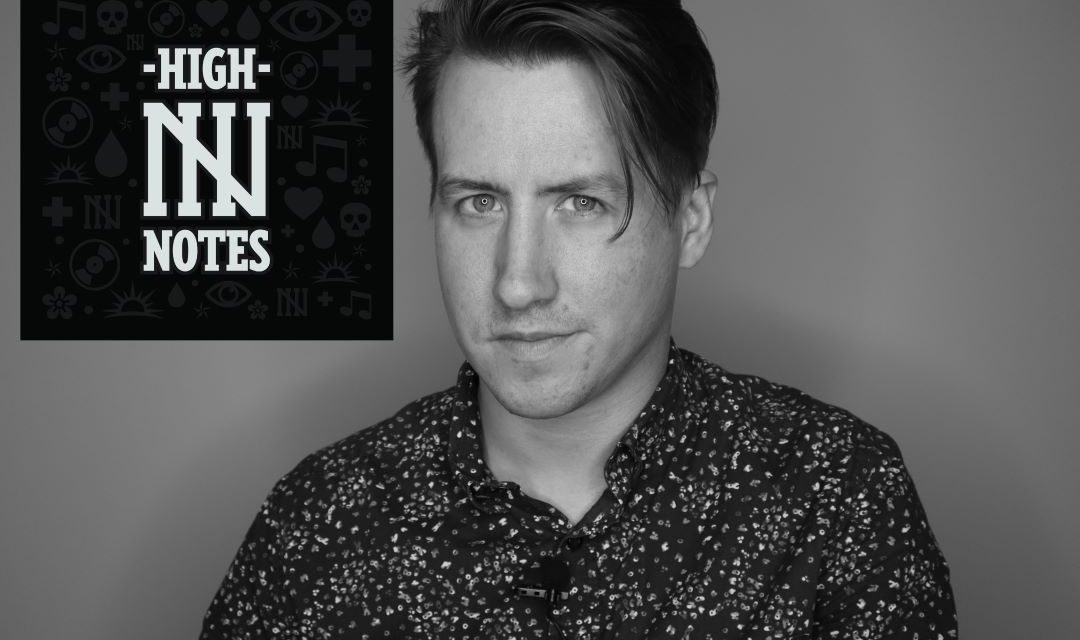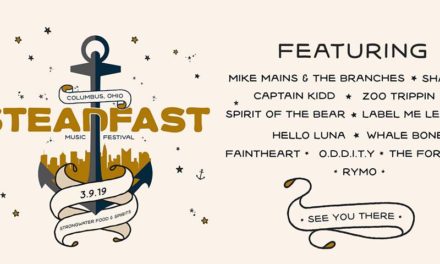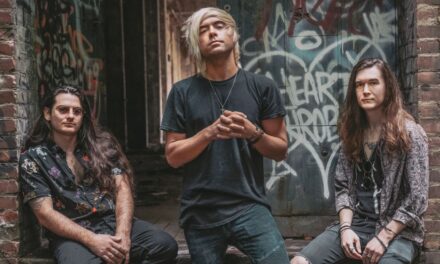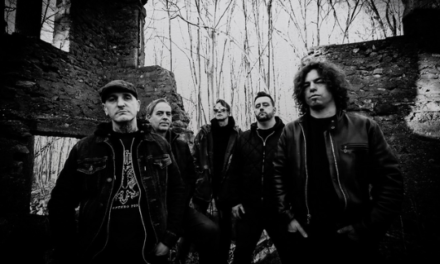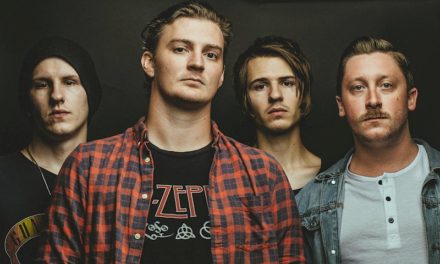High Notes is a new podcast hosted by James Shotwell that focuses on addiction and recovery within the music industry and features interviews with Bert McCracken (The Used), Anthony Green (Circa Survive/Saosin), Nick Martin (Sleeping With Sirens), and more. James recently took the time to answer some of my questions regarding the podcast ranging from its inspiration to what he hopes people will gain from listening.
High Notes is a music-focused recovery podcast. Each week, host James Shotwell speaks with an influential member of the rock world about their experiences with addiction and their journey to recovery.
Each season of the show is limited to seven episodes. The inaugural season features conversations Brian “Head” Welch (KoRn), Bert McCracken (The Used), Tommy Vext (Bad Wolves), Anthony Green (Circa Survive/Saosin), Ronnie Winter (Red Jumpsuit Apparatus), Nick Martin (Sleeping With Sirens), Haley Butters (absinthe father), and Justin Furstenfeld (Blue October).
Each episode details the ups and downs of the guest’s recovery efforts, with some detailing the dark days that lead them to make a change. Throughout the series, one message is clear: We need more empathy and support for those battling addiction.
All questions were answered by James Shotwell, host of High Notes and Director of Customer Engagement at Haulix.
Q: So to start things out, your new project, a podcast called High Notes, focuses on addiction and recovery within the music industry. Can you expand a bit more about it and the topics covered?
A: High Notes is a recovery podcast. Each episode features a different musician sharing their journey to sobriety and all the lessons learned along the way. Unlike many podcasts in music today, High Notes is not a traditional interview series with straightforward Q&A. We flesh out our guest’s narratives with song clips and informational cutaways. We do not promote new music or tours. We work hard to keep addiction and recovery the sole focus.
Q: To take things back to the beginning, what was the inspiration behind the podcast, and how did the idea come to fruition?
A: In July of 2019, I spent an evening in Detroit at The Shelter (a music venue) watching my friend Anthony Green perform a solo show celebrating the ten-year anniversary of his debut record, Avalon. Anthony and I were speaking in the green room before his set, and I mentioned wanting to develop a new podcast. I told him that too many podcasts exist solely to promote new music, and that most seem to churn out content for the sake of creating content. I want to have a show that runs in seasons, which allows us to make each episode as good as possible. We have deadlines, but not nearly as many.
Anthony suggested the name High Notes and the idea of speaking about addiction at length. I loved the idea immediately, but I didn’t begin pursuing it until November of that year. Anthony relapsed, and when he told me the news I thought, “Now we have a reason to do that show.”
Oddly enough, Anthony was one of the last guests to record their episode, but he knew of the series from the very start.
I wanted to make the show a reality because I wanted to help people see addicts in a new light. I think people with addictions are often written off as junkies or something equally terrible. They’re people, just like you and me, who are struggling with a disease that claims countless lives every year. My hope is that by having these conversations we are able to not only help people understand the experiences of addicts, but that we will hopefully generate more empathy for them as well. I want people to feel empowered to do something to help themselves or others.
Q: Would you mind telling me a bit about the guests you bring in to participate and why you chose them specifically to be involved?
A: The first season of High Notes has eight guests. That includes Bert McCracken from The Used, Anthony Green of Circa Survive and Saosin, Tommy Vext of Bad Wolves, Nick Martin of Sleeping With Sirens, Justin Furstenfeld of Blue October, Haley Butters of absinthe father, Brian “Head” Welch of KoRn, and Ronnie Winter of Red Jumpsuit Apparatus.
We spent a lot of time trying to identify potential guests that we knew had stories to tell, but also people we thought would be willing to speak about their struggles at length. Some people in addiction don’t feel comfortable speaking about their recovery and others worry that pondering their problems too much will lead to relapse. We made every effort possible to ensure our guests were comfortable and confident. To our surprise, most were excited to give back to the community.
I will say that we did offer episodes to half a dozen musicians that either declined or didn’t reply. My hope is that they choose to appear later, but if not, that’s okay.
Q: Speaking of the guests, was there any common theme (or themes) you noticed throughout the conversations you had with them?
A: Generally speaking, early success in a career seems to create a lot of opportunity for trouble. When you’re in your late teens or early twenties and have a hit song, the world falls at your feet. People are bending over backward to give you anything you desire, and sometimes, that opens the door for addictive behaviors.
On another, brighter side, a lot of our guests discuss journaling as a powerful tool in the recovery process. It’s one thing to be honest with others, but being honest with yourself is a big deal, and writing out your journey can help you make better choices moving forward.
Q: What about something you learned throughout the conversations that surprised you or maybe you just hadn’t recognized previously?
A: I always thought of the 12-step program as this perfect formula for success. Movies and TV shows make it seem like anyone in alcoholic anonymous that does the work will recover, but what I’ve learned from working on High Notes is that it’s not simple. There are tools and philosophies that help many people on the path to sobriety, but every journey is unique, and what works for one or many people may not work for you. The trick is finding the strength and determination to keep working on yourself as long as it takes to get clean.
Q: I don’t know if it’s something that came up during any of your conversations, but there is certainly the stereotype attributed to that so-called rockstar life – partying, more partying, and playing a show somewhere in between. Do you think the “rock and roll lifestyle” image has contributed to the perpetuation of addiction within the industry?
A: Absolutely. The so-called “rockstars” of today grew up watching rockstars of yesteryear. For many, being a rockstar is synonymous with being a party animal, which I believe is why people who are successful often fall prey to the same bad behavior that plagued previous generations. People are trying to be someone they’re not because culture or society has taught them it’s what their job entails.
Q: Recently, I’ve noticed a number of members of both small local and well known bands speaking out, even if just on social media, about realizing they need to get clean and stay clean, make amends for their past mistakes, and take recovery seriously. Do you feel that the straightedge culture and PMA (Positive Mental Attitude) concept has helped in any way, or possibly even simply that more and more are speaking about their demons publicly?
A: I believe we all understand this chaos called existence better when we share our experiences, both good and bad, with one another. Problems arise when we tell people they can’t or shouldn’t share their experiences. That’s when we lose our empathy, and to me, empathy derived from conversation is the key to a more united species.
Q: I’m certainly of the mindset that those of us within the music industry need to help each other and look out for one another. If someone out there is suffering or struggling in their addiction or recovery, or if someone is struggling while watching someone else in their life go through it, what is the first step? What was the first step that some of your guests took?
A: Ask for help. Ask your parents, your friends, your bandmates. Ask anyone and everyone. If you have no one to turn to, you can ask me or anyone connected with High Notes. You can also find and attend meetings. You need to accept that you cannot fight this battle alone, and when you do, there will be people who want to help you. I want to help, and I don’t even know you, but I do want you to get better.
Q: What do you hope people will gain from listening to the podcast? Did you gain anything from hosting, and do you feel the guests gained anything from participating?
A: I want people to think about addiction differently. I hope that by listening to conversations with musicians they know or admire that they start to see them less as performers and more as human beings. We need to demystify addiction in order to address it, and once we do that, then we need to start talking about it. My biggest hope is that this show makes it easier for someone to seek help or have a conversation with someone they fear is caught up in addiction. I just want people to take care of themselves and one another.
As for me, I think this podcast really opened my eyes to how much addiction effects people, and how each addiction is unique. We talk about drugs and behaviors I would never believe are prevalent in music if I didn’t hear it from someone who experienced it firsthand, and that knowledge has only made me more determined to help people as much as I possibly can. It has also made me reconsider comments and criticisms I’ve made about people struggling with addiction in the public eye. I’ve been an asshole. I think a lot of us have, to be honest, but we can change. We can stop talking down to people struggling with addiction and start helping them find ways to lead better, healthy lives.
Q: To finish things up, when and where will people be able to listen to High Notes? Is there anything else you’d like to mention about the podcast that we haven’t covered?
A: The entire first season of High Notes will be released on Tuesday, July 28. The show will be available on all podcast platforms, as well as YouTube. We are also making transcripts of each episode available. There is a teaser out now, so you can find the show on your favorite platform and subscribe before the season drops. There will be more episodes in months ahead, but I don’t want to give too much away just yet.

